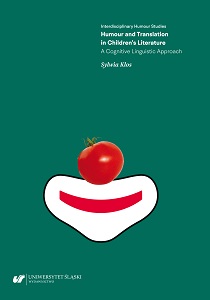Humour and Translation in Children’s Literature. A Cognitive Linguistic Approach
Humour and Translation in Children’s Literature. A Cognitive Linguistic Approach
Author(s): Sylwia Klos
Subject(s): Anthropology, Social Sciences, Language and Literature Studies, Psychology, Theoretical Linguistics, Applied Linguistics, Studies of Literature, Sociology, Cognitive linguistics, Comparative Study of Literature, Culture and social structure , Rural and urban sociology, Translation Studies, Theory of Literature
ISSN: 2719-8235
Published by: Wydawnictwo Uniwersytetu Śląskiego
Keywords: humour; translation of children's literature; cognitive approach to translation; conceptual integration; mental maps
Summary/Abstract: The present book combines the results of my studies on developmental psychology, theories on humour, translation theories and cognitive linguistics with the special emphasis on the theory of mental spaces and conceptual integration. Gill Fauconnier and Mark Turner’s model of conceptual blending serves as a basis for creating mental maps that can be used by translators as tools in translating humour, especially wordplays. // The book contains several examples of translating humorous elements taken from English children’s literature (Lewis Carroll’s Alice in Wonderland, Roald Dahl’s The BFG and Francesca Simon’s Horrid Henry) into Polish and Portuguese in its European and Brazilian version with the use of mental maps. Cognitive aspects of translation are strongly emphasised, while translation theories and developmental psychology can be treated as a background for translation analysis and evaluation.
Series: Studia literackie
- E-ISBN-13: 978-83-226-3867-5
- Print-ISBN-13: 978-83-226-3866-8
- Page Count: 159
- Publication Year: 2020
- Language: English
- eBook-PDF
- Table of Content
- Introduction

